TM6101 Food, Society, and Culture: UK Healthy Diet Report Analysis
VerifiedAdded on 2022/12/27
|7
|2052
|74
Report
AI Summary
This report, titled "Healthy Diet," examines the multifaceted aspects of a healthy diet within the context of UK society, drawing on social, cultural, and religious perspectives. It delves into how socio-economic factors, including income levels and access to fresh food, influence dietary choices and health outcomes. The report highlights the impact of cultural diversity, religious beliefs, and evolving food practices on consumption patterns, with a specific focus on how digital technologies and online food delivery services are reshaping eating habits. It further analyzes the influence of cultural backgrounds, lifestyle factors, and market trends on food consumption in the UK, concluding that despite widespread awareness, actual dietary habits often fall short of recommended standards. The report also includes a group work diary detailing the collaborative process and references relevant literature.
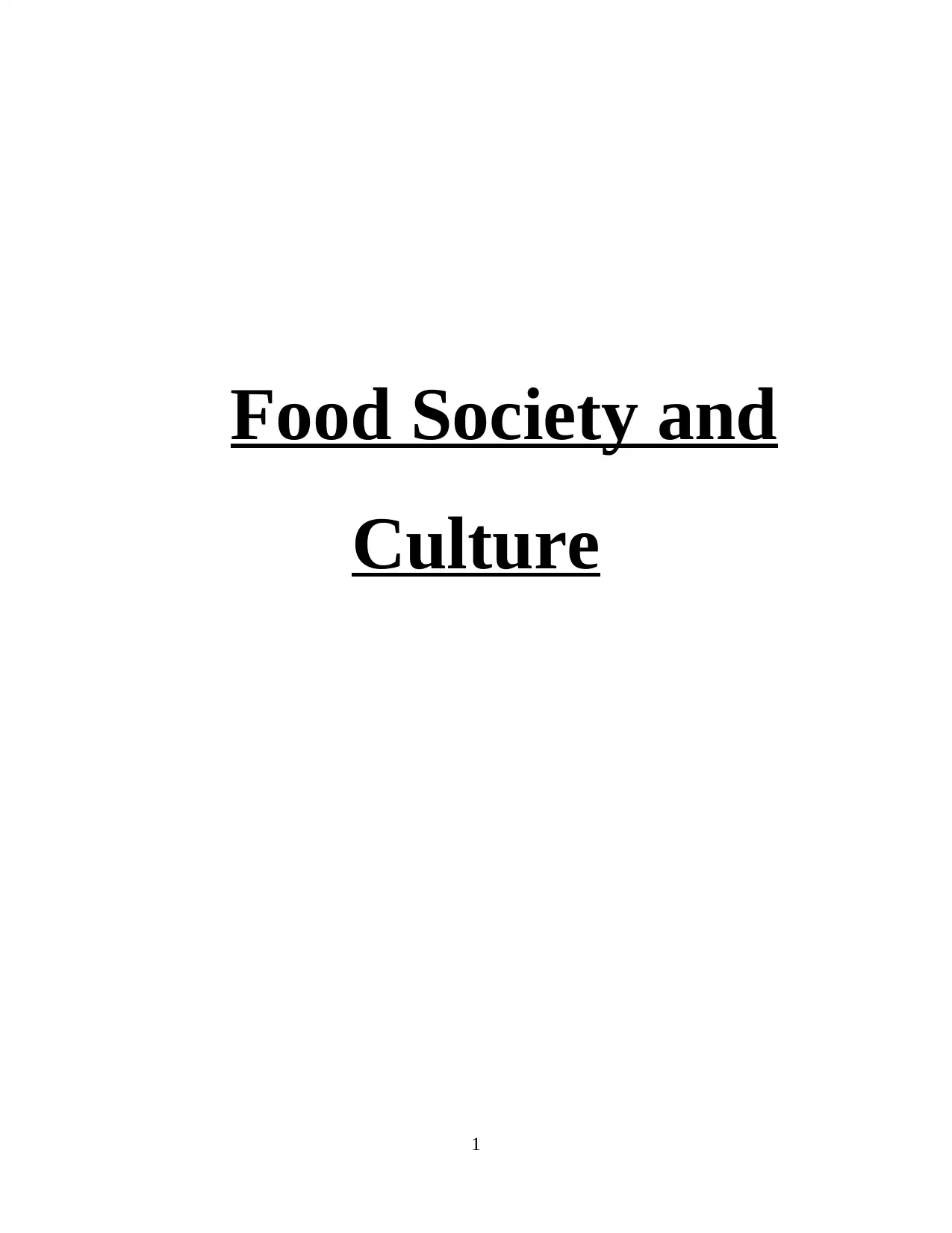
Food Society and
Culture
1
Culture
1
Paraphrase This Document
Need a fresh take? Get an instant paraphrase of this document with our AI Paraphraser
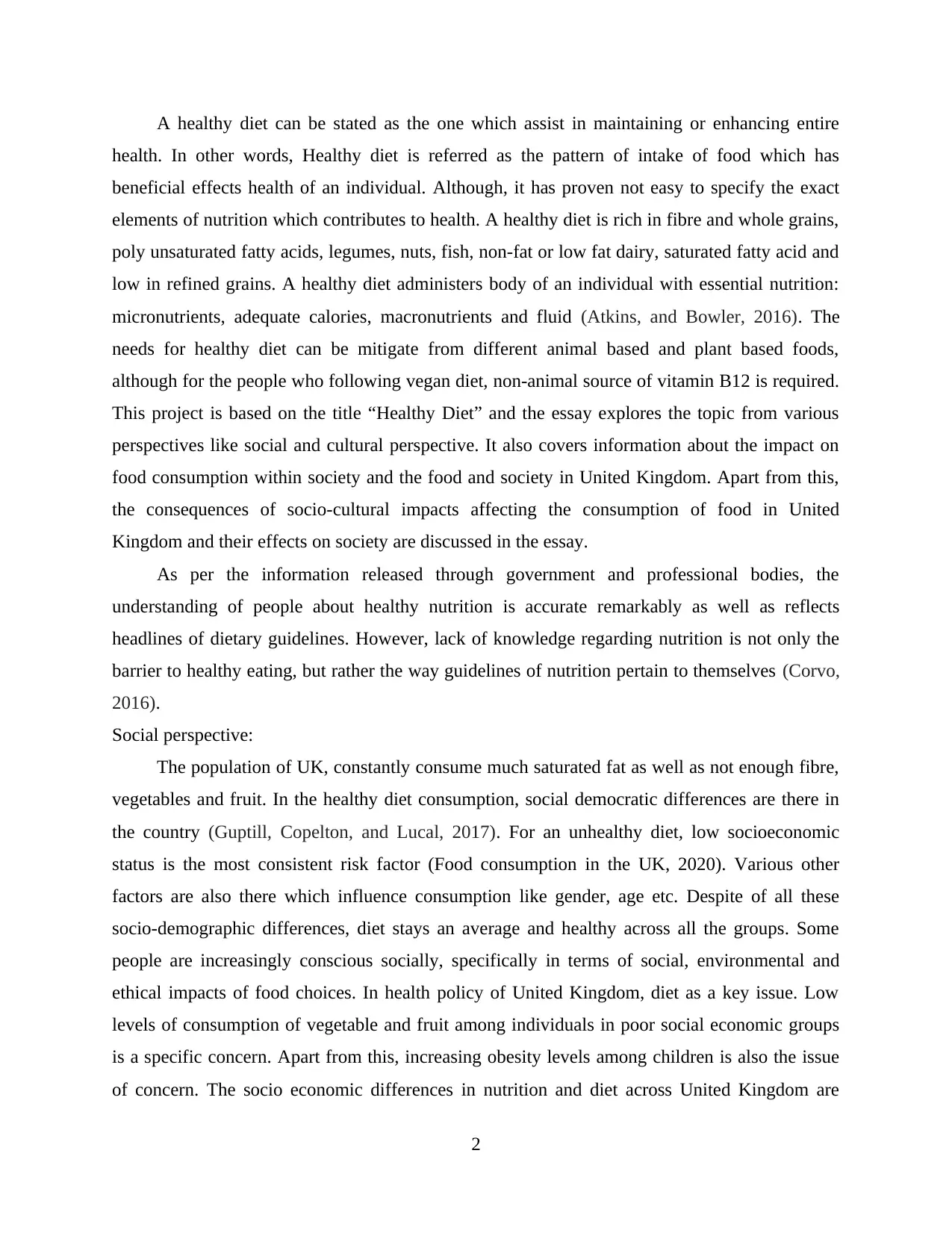
A healthy diet can be stated as the one which assist in maintaining or enhancing entire
health. In other words, Healthy diet is referred as the pattern of intake of food which has
beneficial effects health of an individual. Although, it has proven not easy to specify the exact
elements of nutrition which contributes to health. A healthy diet is rich in fibre and whole grains,
poly unsaturated fatty acids, legumes, nuts, fish, non-fat or low fat dairy, saturated fatty acid and
low in refined grains. A healthy diet administers body of an individual with essential nutrition:
micronutrients, adequate calories, macronutrients and fluid (Atkins, and Bowler, 2016). The
needs for healthy diet can be mitigate from different animal based and plant based foods,
although for the people who following vegan diet, non-animal source of vitamin B12 is required.
This project is based on the title “Healthy Diet” and the essay explores the topic from various
perspectives like social and cultural perspective. It also covers information about the impact on
food consumption within society and the food and society in United Kingdom. Apart from this,
the consequences of socio-cultural impacts affecting the consumption of food in United
Kingdom and their effects on society are discussed in the essay.
As per the information released through government and professional bodies, the
understanding of people about healthy nutrition is accurate remarkably as well as reflects
headlines of dietary guidelines. However, lack of knowledge regarding nutrition is not only the
barrier to healthy eating, but rather the way guidelines of nutrition pertain to themselves (Corvo,
2016).
Social perspective:
The population of UK, constantly consume much saturated fat as well as not enough fibre,
vegetables and fruit. In the healthy diet consumption, social democratic differences are there in
the country (Guptill, Copelton, and Lucal, 2017). For an unhealthy diet, low socioeconomic
status is the most consistent risk factor (Food consumption in the UK, 2020). Various other
factors are also there which influence consumption like gender, age etc. Despite of all these
socio-demographic differences, diet stays an average and healthy across all the groups. Some
people are increasingly conscious socially, specifically in terms of social, environmental and
ethical impacts of food choices. In health policy of United Kingdom, diet as a key issue. Low
levels of consumption of vegetable and fruit among individuals in poor social economic groups
is a specific concern. Apart from this, increasing obesity levels among children is also the issue
of concern. The socio economic differences in nutrition and diet across United Kingdom are
2
health. In other words, Healthy diet is referred as the pattern of intake of food which has
beneficial effects health of an individual. Although, it has proven not easy to specify the exact
elements of nutrition which contributes to health. A healthy diet is rich in fibre and whole grains,
poly unsaturated fatty acids, legumes, nuts, fish, non-fat or low fat dairy, saturated fatty acid and
low in refined grains. A healthy diet administers body of an individual with essential nutrition:
micronutrients, adequate calories, macronutrients and fluid (Atkins, and Bowler, 2016). The
needs for healthy diet can be mitigate from different animal based and plant based foods,
although for the people who following vegan diet, non-animal source of vitamin B12 is required.
This project is based on the title “Healthy Diet” and the essay explores the topic from various
perspectives like social and cultural perspective. It also covers information about the impact on
food consumption within society and the food and society in United Kingdom. Apart from this,
the consequences of socio-cultural impacts affecting the consumption of food in United
Kingdom and their effects on society are discussed in the essay.
As per the information released through government and professional bodies, the
understanding of people about healthy nutrition is accurate remarkably as well as reflects
headlines of dietary guidelines. However, lack of knowledge regarding nutrition is not only the
barrier to healthy eating, but rather the way guidelines of nutrition pertain to themselves (Corvo,
2016).
Social perspective:
The population of UK, constantly consume much saturated fat as well as not enough fibre,
vegetables and fruit. In the healthy diet consumption, social democratic differences are there in
the country (Guptill, Copelton, and Lucal, 2017). For an unhealthy diet, low socioeconomic
status is the most consistent risk factor (Food consumption in the UK, 2020). Various other
factors are also there which influence consumption like gender, age etc. Despite of all these
socio-demographic differences, diet stays an average and healthy across all the groups. Some
people are increasingly conscious socially, specifically in terms of social, environmental and
ethical impacts of food choices. In health policy of United Kingdom, diet as a key issue. Low
levels of consumption of vegetable and fruit among individuals in poor social economic groups
is a specific concern. Apart from this, increasing obesity levels among children is also the issue
of concern. The socio economic differences in nutrition and diet across United Kingdom are
2
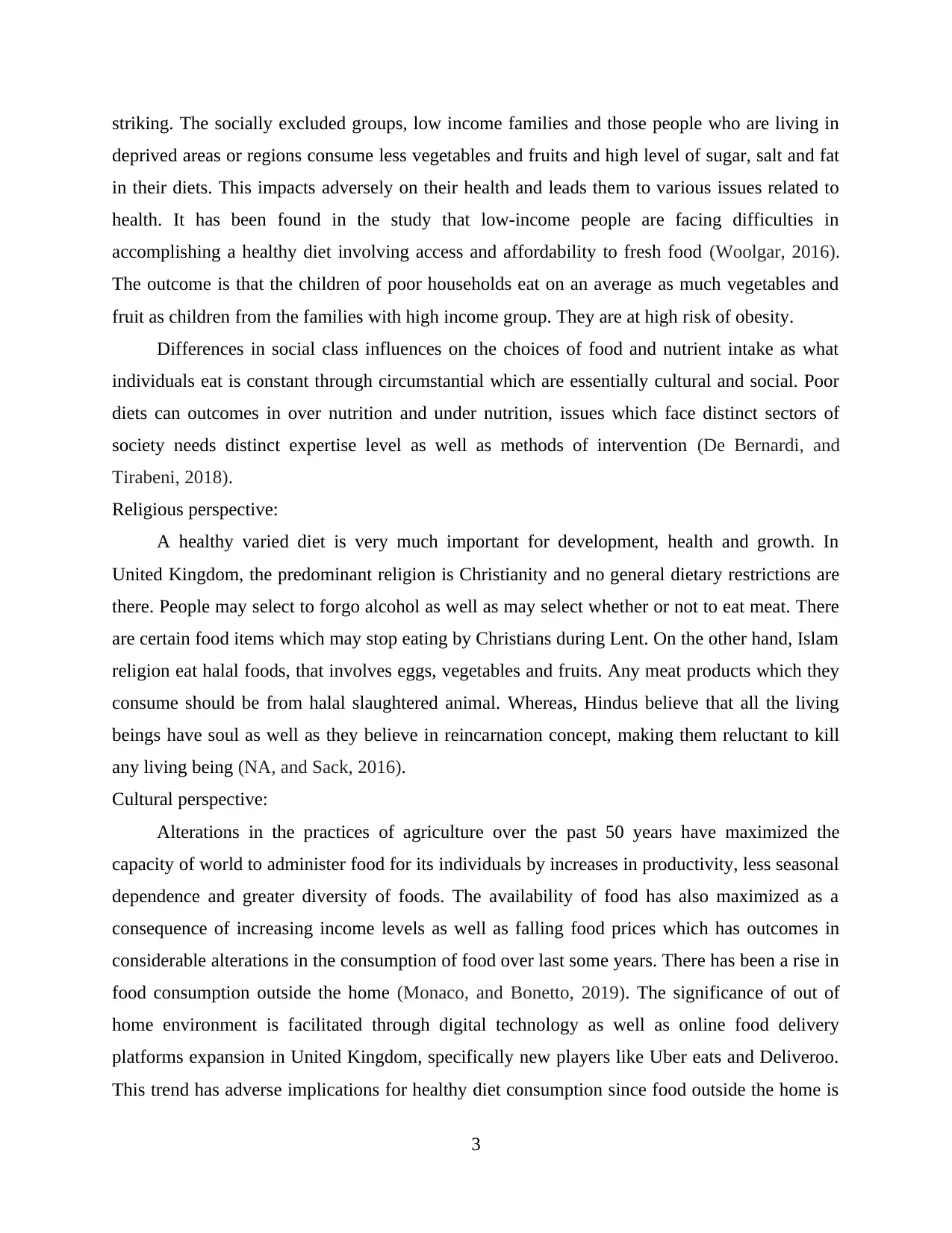
striking. The socially excluded groups, low income families and those people who are living in
deprived areas or regions consume less vegetables and fruits and high level of sugar, salt and fat
in their diets. This impacts adversely on their health and leads them to various issues related to
health. It has been found in the study that low-income people are facing difficulties in
accomplishing a healthy diet involving access and affordability to fresh food (Woolgar, 2016).
The outcome is that the children of poor households eat on an average as much vegetables and
fruit as children from the families with high income group. They are at high risk of obesity.
Differences in social class influences on the choices of food and nutrient intake as what
individuals eat is constant through circumstantial which are essentially cultural and social. Poor
diets can outcomes in over nutrition and under nutrition, issues which face distinct sectors of
society needs distinct expertise level as well as methods of intervention (De Bernardi, and
Tirabeni, 2018).
Religious perspective:
A healthy varied diet is very much important for development, health and growth. In
United Kingdom, the predominant religion is Christianity and no general dietary restrictions are
there. People may select to forgo alcohol as well as may select whether or not to eat meat. There
are certain food items which may stop eating by Christians during Lent. On the other hand, Islam
religion eat halal foods, that involves eggs, vegetables and fruits. Any meat products which they
consume should be from halal slaughtered animal. Whereas, Hindus believe that all the living
beings have soul as well as they believe in reincarnation concept, making them reluctant to kill
any living being (NA, and Sack, 2016).
Cultural perspective:
Alterations in the practices of agriculture over the past 50 years have maximized the
capacity of world to administer food for its individuals by increases in productivity, less seasonal
dependence and greater diversity of foods. The availability of food has also maximized as a
consequence of increasing income levels as well as falling food prices which has outcomes in
considerable alterations in the consumption of food over last some years. There has been a rise in
food consumption outside the home (Monaco, and Bonetto, 2019). The significance of out of
home environment is facilitated through digital technology as well as online food delivery
platforms expansion in United Kingdom, specifically new players like Uber eats and Deliveroo.
This trend has adverse implications for healthy diet consumption since food outside the home is
3
deprived areas or regions consume less vegetables and fruits and high level of sugar, salt and fat
in their diets. This impacts adversely on their health and leads them to various issues related to
health. It has been found in the study that low-income people are facing difficulties in
accomplishing a healthy diet involving access and affordability to fresh food (Woolgar, 2016).
The outcome is that the children of poor households eat on an average as much vegetables and
fruit as children from the families with high income group. They are at high risk of obesity.
Differences in social class influences on the choices of food and nutrient intake as what
individuals eat is constant through circumstantial which are essentially cultural and social. Poor
diets can outcomes in over nutrition and under nutrition, issues which face distinct sectors of
society needs distinct expertise level as well as methods of intervention (De Bernardi, and
Tirabeni, 2018).
Religious perspective:
A healthy varied diet is very much important for development, health and growth. In
United Kingdom, the predominant religion is Christianity and no general dietary restrictions are
there. People may select to forgo alcohol as well as may select whether or not to eat meat. There
are certain food items which may stop eating by Christians during Lent. On the other hand, Islam
religion eat halal foods, that involves eggs, vegetables and fruits. Any meat products which they
consume should be from halal slaughtered animal. Whereas, Hindus believe that all the living
beings have soul as well as they believe in reincarnation concept, making them reluctant to kill
any living being (NA, and Sack, 2016).
Cultural perspective:
Alterations in the practices of agriculture over the past 50 years have maximized the
capacity of world to administer food for its individuals by increases in productivity, less seasonal
dependence and greater diversity of foods. The availability of food has also maximized as a
consequence of increasing income levels as well as falling food prices which has outcomes in
considerable alterations in the consumption of food over last some years. There has been a rise in
food consumption outside the home (Monaco, and Bonetto, 2019). The significance of out of
home environment is facilitated through digital technology as well as online food delivery
platforms expansion in United Kingdom, specifically new players like Uber eats and Deliveroo.
This trend has adverse implications for healthy diet consumption since food outside the home is
3
⊘ This is a preview!⊘
Do you want full access?
Subscribe today to unlock all pages.

Trusted by 1+ million students worldwide
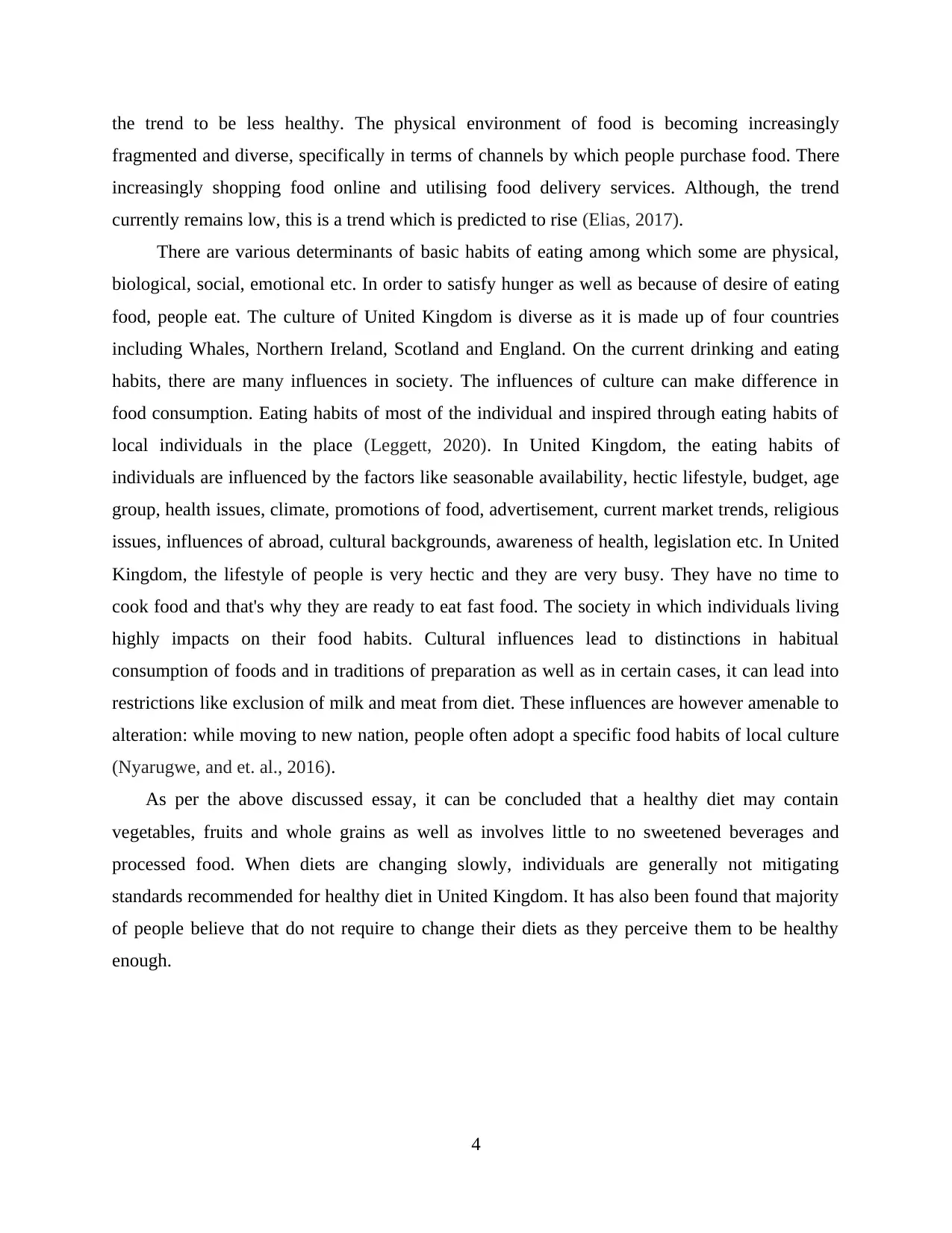
the trend to be less healthy. The physical environment of food is becoming increasingly
fragmented and diverse, specifically in terms of channels by which people purchase food. There
increasingly shopping food online and utilising food delivery services. Although, the trend
currently remains low, this is a trend which is predicted to rise (Elias, 2017).
There are various determinants of basic habits of eating among which some are physical,
biological, social, emotional etc. In order to satisfy hunger as well as because of desire of eating
food, people eat. The culture of United Kingdom is diverse as it is made up of four countries
including Whales, Northern Ireland, Scotland and England. On the current drinking and eating
habits, there are many influences in society. The influences of culture can make difference in
food consumption. Eating habits of most of the individual and inspired through eating habits of
local individuals in the place (Leggett, 2020). In United Kingdom, the eating habits of
individuals are influenced by the factors like seasonable availability, hectic lifestyle, budget, age
group, health issues, climate, promotions of food, advertisement, current market trends, religious
issues, influences of abroad, cultural backgrounds, awareness of health, legislation etc. In United
Kingdom, the lifestyle of people is very hectic and they are very busy. They have no time to
cook food and that's why they are ready to eat fast food. The society in which individuals living
highly impacts on their food habits. Cultural influences lead to distinctions in habitual
consumption of foods and in traditions of preparation as well as in certain cases, it can lead into
restrictions like exclusion of milk and meat from diet. These influences are however amenable to
alteration: while moving to new nation, people often adopt a specific food habits of local culture
(Nyarugwe, and et. al., 2016).
As per the above discussed essay, it can be concluded that a healthy diet may contain
vegetables, fruits and whole grains as well as involves little to no sweetened beverages and
processed food. When diets are changing slowly, individuals are generally not mitigating
standards recommended for healthy diet in United Kingdom. It has also been found that majority
of people believe that do not require to change their diets as they perceive them to be healthy
enough.
4
fragmented and diverse, specifically in terms of channels by which people purchase food. There
increasingly shopping food online and utilising food delivery services. Although, the trend
currently remains low, this is a trend which is predicted to rise (Elias, 2017).
There are various determinants of basic habits of eating among which some are physical,
biological, social, emotional etc. In order to satisfy hunger as well as because of desire of eating
food, people eat. The culture of United Kingdom is diverse as it is made up of four countries
including Whales, Northern Ireland, Scotland and England. On the current drinking and eating
habits, there are many influences in society. The influences of culture can make difference in
food consumption. Eating habits of most of the individual and inspired through eating habits of
local individuals in the place (Leggett, 2020). In United Kingdom, the eating habits of
individuals are influenced by the factors like seasonable availability, hectic lifestyle, budget, age
group, health issues, climate, promotions of food, advertisement, current market trends, religious
issues, influences of abroad, cultural backgrounds, awareness of health, legislation etc. In United
Kingdom, the lifestyle of people is very hectic and they are very busy. They have no time to
cook food and that's why they are ready to eat fast food. The society in which individuals living
highly impacts on their food habits. Cultural influences lead to distinctions in habitual
consumption of foods and in traditions of preparation as well as in certain cases, it can lead into
restrictions like exclusion of milk and meat from diet. These influences are however amenable to
alteration: while moving to new nation, people often adopt a specific food habits of local culture
(Nyarugwe, and et. al., 2016).
As per the above discussed essay, it can be concluded that a healthy diet may contain
vegetables, fruits and whole grains as well as involves little to no sweetened beverages and
processed food. When diets are changing slowly, individuals are generally not mitigating
standards recommended for healthy diet in United Kingdom. It has also been found that majority
of people believe that do not require to change their diets as they perceive them to be healthy
enough.
4
Paraphrase This Document
Need a fresh take? Get an instant paraphrase of this document with our AI Paraphraser
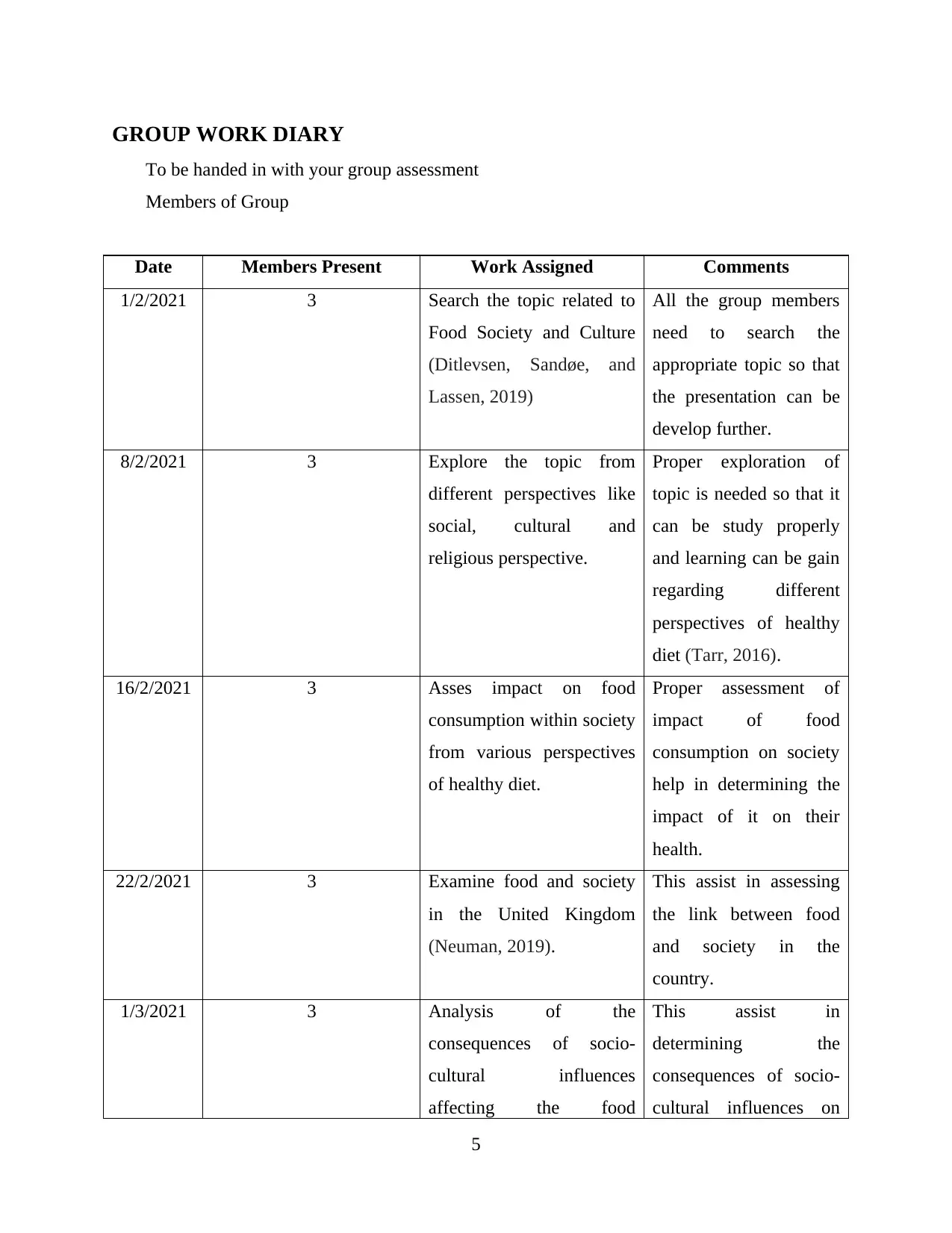
GROUP WORK DIARY
To be handed in with your group assessment
Members of Group
Date Members Present Work Assigned Comments
1/2/2021 3 Search the topic related to
Food Society and Culture
(Ditlevsen, Sandøe, and
Lassen, 2019)
All the group members
need to search the
appropriate topic so that
the presentation can be
develop further.
8/2/2021 3 Explore the topic from
different perspectives like
social, cultural and
religious perspective.
Proper exploration of
topic is needed so that it
can be study properly
and learning can be gain
regarding different
perspectives of healthy
diet (Tarr, 2016).
16/2/2021 3 Asses impact on food
consumption within society
from various perspectives
of healthy diet.
Proper assessment of
impact of food
consumption on society
help in determining the
impact of it on their
health.
22/2/2021 3 Examine food and society
in the United Kingdom
(Neuman, 2019).
This assist in assessing
the link between food
and society in the
country.
1/3/2021 3 Analysis of the
consequences of socio-
cultural influences
affecting the food
This assist in
determining the
consequences of socio-
cultural influences on
5
To be handed in with your group assessment
Members of Group
Date Members Present Work Assigned Comments
1/2/2021 3 Search the topic related to
Food Society and Culture
(Ditlevsen, Sandøe, and
Lassen, 2019)
All the group members
need to search the
appropriate topic so that
the presentation can be
develop further.
8/2/2021 3 Explore the topic from
different perspectives like
social, cultural and
religious perspective.
Proper exploration of
topic is needed so that it
can be study properly
and learning can be gain
regarding different
perspectives of healthy
diet (Tarr, 2016).
16/2/2021 3 Asses impact on food
consumption within society
from various perspectives
of healthy diet.
Proper assessment of
impact of food
consumption on society
help in determining the
impact of it on their
health.
22/2/2021 3 Examine food and society
in the United Kingdom
(Neuman, 2019).
This assist in assessing
the link between food
and society in the
country.
1/3/2021 3 Analysis of the
consequences of socio-
cultural influences
affecting the food
This assist in
determining the
consequences of socio-
cultural influences on
5
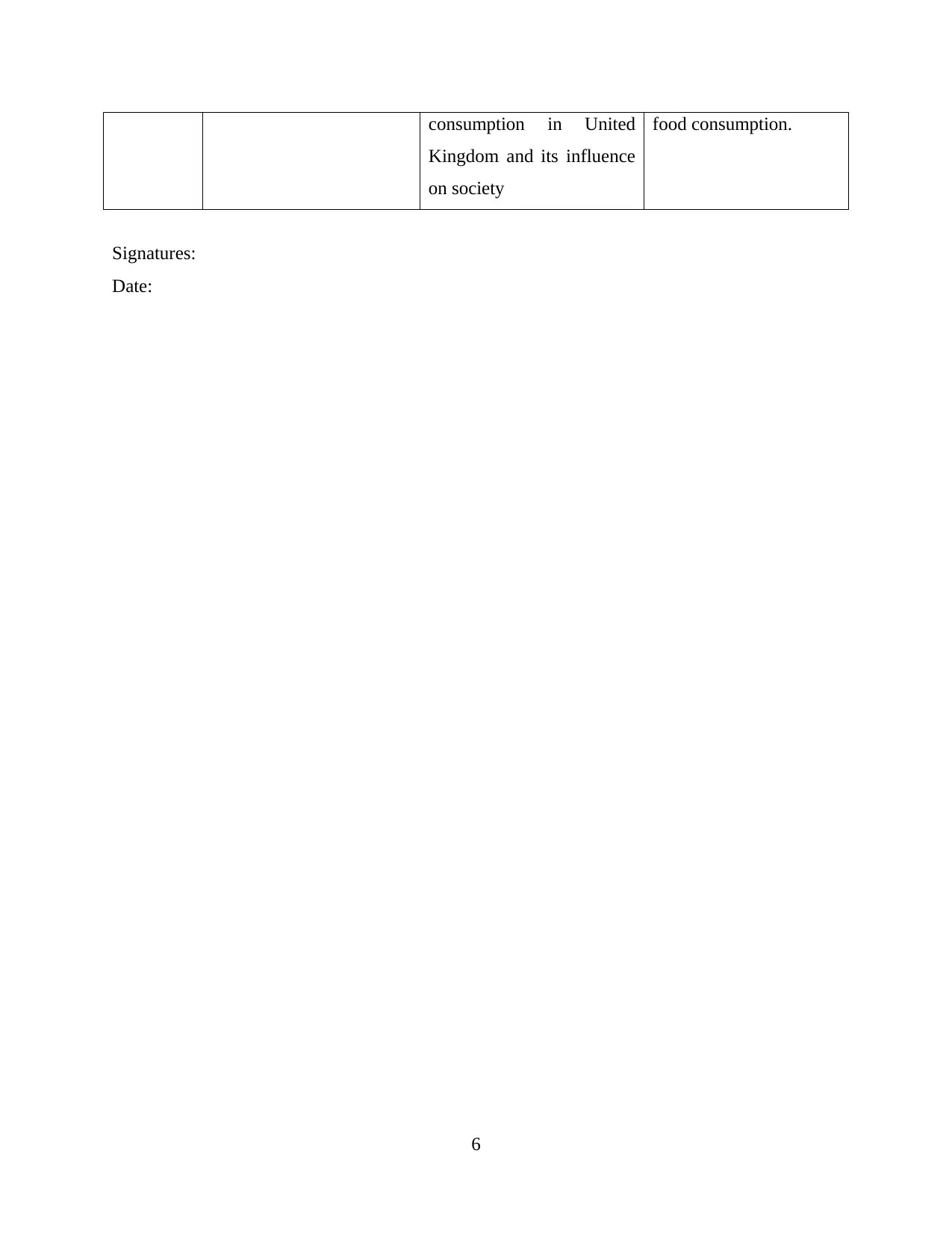
consumption in United
Kingdom and its influence
on society
food consumption.
Signatures:
Date:
6
Kingdom and its influence
on society
food consumption.
Signatures:
Date:
6
⊘ This is a preview!⊘
Do you want full access?
Subscribe today to unlock all pages.

Trusted by 1+ million students worldwide
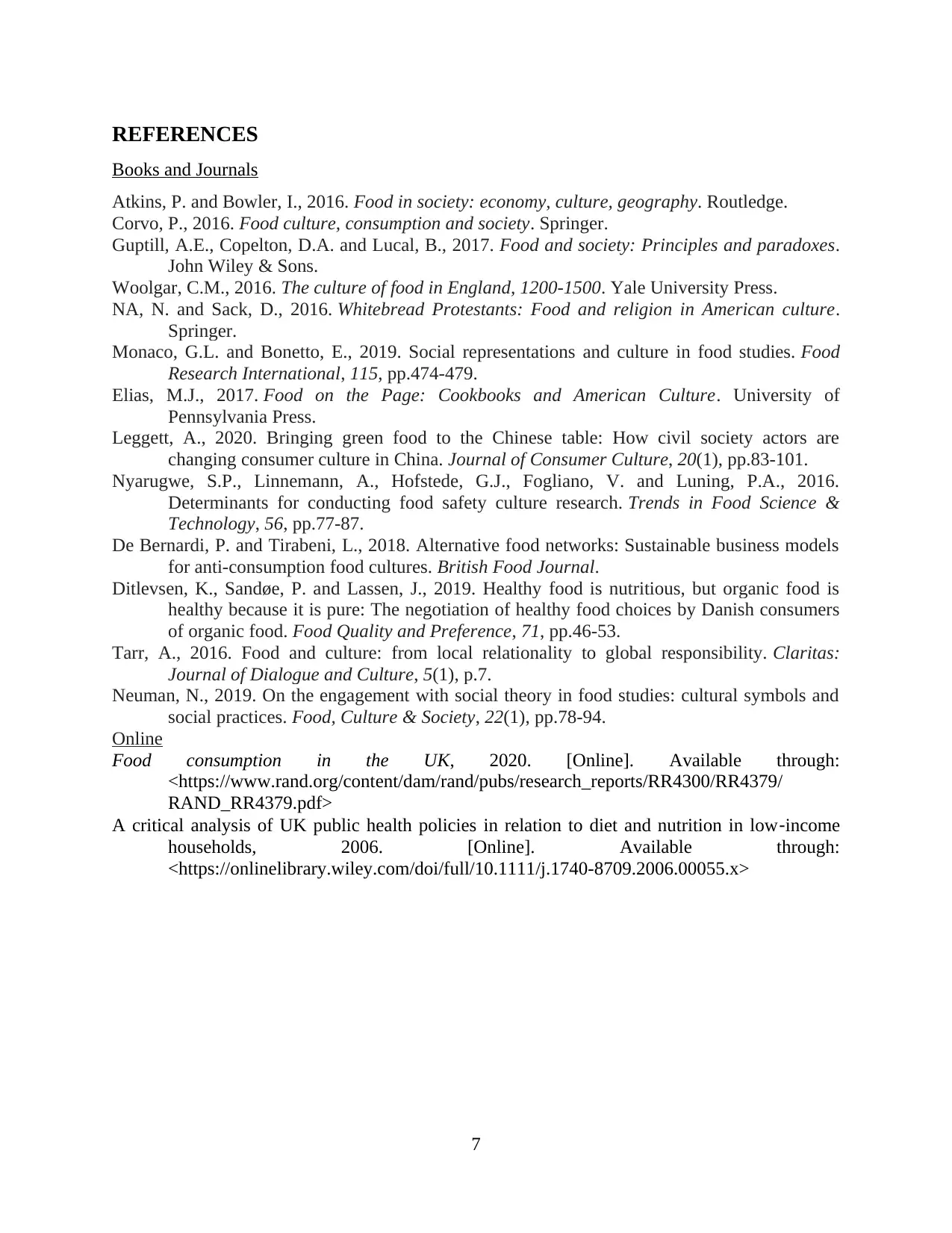
REFERENCES
Books and Journals
Atkins, P. and Bowler, I., 2016. Food in society: economy, culture, geography. Routledge.
Corvo, P., 2016. Food culture, consumption and society. Springer.
Guptill, A.E., Copelton, D.A. and Lucal, B., 2017. Food and society: Principles and paradoxes.
John Wiley & Sons.
Woolgar, C.M., 2016. The culture of food in England, 1200-1500. Yale University Press.
NA, N. and Sack, D., 2016. Whitebread Protestants: Food and religion in American culture.
Springer.
Monaco, G.L. and Bonetto, E., 2019. Social representations and culture in food studies. Food
Research International, 115, pp.474-479.
Elias, M.J., 2017. Food on the Page: Cookbooks and American Culture. University of
Pennsylvania Press.
Leggett, A., 2020. Bringing green food to the Chinese table: How civil society actors are
changing consumer culture in China. Journal of Consumer Culture, 20(1), pp.83-101.
Nyarugwe, S.P., Linnemann, A., Hofstede, G.J., Fogliano, V. and Luning, P.A., 2016.
Determinants for conducting food safety culture research. Trends in Food Science &
Technology, 56, pp.77-87.
De Bernardi, P. and Tirabeni, L., 2018. Alternative food networks: Sustainable business models
for anti-consumption food cultures. British Food Journal.
Ditlevsen, K., Sandøe, P. and Lassen, J., 2019. Healthy food is nutritious, but organic food is
healthy because it is pure: The negotiation of healthy food choices by Danish consumers
of organic food. Food Quality and Preference, 71, pp.46-53.
Tarr, A., 2016. Food and culture: from local relationality to global responsibility. Claritas:
Journal of Dialogue and Culture, 5(1), p.7.
Neuman, N., 2019. On the engagement with social theory in food studies: cultural symbols and
social practices. Food, Culture & Society, 22(1), pp.78-94.
Online
Food consumption in the UK, 2020. [Online]. Available through:
<https://www.rand.org/content/dam/rand/pubs/research_reports/RR4300/RR4379/
RAND_RR4379.pdf>
A critical analysis of UK public health policies in relation to diet and nutrition in low‐income
households, 2006. [Online]. Available through:
<https://onlinelibrary.wiley.com/doi/full/10.1111/j.1740-8709.2006.00055.x>
7
Books and Journals
Atkins, P. and Bowler, I., 2016. Food in society: economy, culture, geography. Routledge.
Corvo, P., 2016. Food culture, consumption and society. Springer.
Guptill, A.E., Copelton, D.A. and Lucal, B., 2017. Food and society: Principles and paradoxes.
John Wiley & Sons.
Woolgar, C.M., 2016. The culture of food in England, 1200-1500. Yale University Press.
NA, N. and Sack, D., 2016. Whitebread Protestants: Food and religion in American culture.
Springer.
Monaco, G.L. and Bonetto, E., 2019. Social representations and culture in food studies. Food
Research International, 115, pp.474-479.
Elias, M.J., 2017. Food on the Page: Cookbooks and American Culture. University of
Pennsylvania Press.
Leggett, A., 2020. Bringing green food to the Chinese table: How civil society actors are
changing consumer culture in China. Journal of Consumer Culture, 20(1), pp.83-101.
Nyarugwe, S.P., Linnemann, A., Hofstede, G.J., Fogliano, V. and Luning, P.A., 2016.
Determinants for conducting food safety culture research. Trends in Food Science &
Technology, 56, pp.77-87.
De Bernardi, P. and Tirabeni, L., 2018. Alternative food networks: Sustainable business models
for anti-consumption food cultures. British Food Journal.
Ditlevsen, K., Sandøe, P. and Lassen, J., 2019. Healthy food is nutritious, but organic food is
healthy because it is pure: The negotiation of healthy food choices by Danish consumers
of organic food. Food Quality and Preference, 71, pp.46-53.
Tarr, A., 2016. Food and culture: from local relationality to global responsibility. Claritas:
Journal of Dialogue and Culture, 5(1), p.7.
Neuman, N., 2019. On the engagement with social theory in food studies: cultural symbols and
social practices. Food, Culture & Society, 22(1), pp.78-94.
Online
Food consumption in the UK, 2020. [Online]. Available through:
<https://www.rand.org/content/dam/rand/pubs/research_reports/RR4300/RR4379/
RAND_RR4379.pdf>
A critical analysis of UK public health policies in relation to diet and nutrition in low‐income
households, 2006. [Online]. Available through:
<https://onlinelibrary.wiley.com/doi/full/10.1111/j.1740-8709.2006.00055.x>
7
1 out of 7
Related Documents
Your All-in-One AI-Powered Toolkit for Academic Success.
+13062052269
info@desklib.com
Available 24*7 on WhatsApp / Email
![[object Object]](/_next/static/media/star-bottom.7253800d.svg)
Unlock your academic potential
Copyright © 2020–2026 A2Z Services. All Rights Reserved. Developed and managed by ZUCOL.





